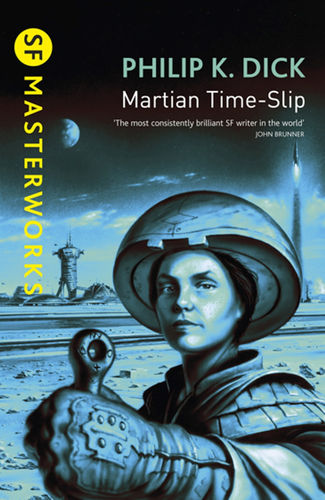Martian Time-Slip by Philip K. Dick
- Very Average Joe
- Oct 9, 2022
- 3 min read
Updated: Jan 20, 2024
Martian Time-Slip was first published as a novel in 1964, although it was published in serialized form in 1963.

Although life is not easy on recently colonized Mars, residents make do with what they have. Water is scarce and goods from Earth are either not available or are only available on the black market.
Jack Bohlen, husband to Silvia and father to David, is a repairman with a history of some form of schizophrenia but functions well enough in his daily life. They emigrated to Mars partly because Jack needs to escape from his schizophrenia. Arnie Kott is the head of the Water Worker’s Local, Fourth Planet Branch, in effect a union organization. He is a selfish bigot who will use people and his connections to get what he wants.
The Franklin D. Roosevelt mountain range is considered worthless but upon hearing of a UN project that will use the land for development, Kott aims to purchase it first so he can sell it to the UN. Unknown to Kott, Jack’s father Leo arrives from Earth also with the intention of making the claim. Meanwhile, Kott tries to get Jack onto his payroll because he needs a repairman.
Intertwined with the land development is a boy named Manfred who is seemingly autistic, but his psychiatrist Dr Milton Glaub theorizes that Mandred perceives time differently. The Martian native population, a primitive nomadic people referred to as “Bleekmen”, also have this ability. The story follows Jack and Kott as the latter tries to take advantage of Manfred’s abilities for his own selfish gain.
Although the premise and plot are not that complicated, there are many minor characters and details that need to be explained. Dick takes his time doing so in the earlier chapters with relatively more chunks of “telling” than his usual tight, cinematic approach.
As such, the pacing at the start is slow by his standards. It is not a poorly written novel by any measure but it is not as good as some of his other works. Nevertheless, all the “telling” and background contribute nicely to the worldbuilding.
Apart from the “time-slip”, there is nothing truly substantial that is central to the story. That is not necessarily a bad thing but the story is simpler than it seems relative to its length, so in this regard it would perhaps make a better short story than a novel.
Dick’s characteristic social commentary is present. However, the issues are not really explored in this novel. They are presented in a not-so-subtle manner, albeit with at least some humor.
The colonization is a multi-national effort involving the UN but this is merely superficial. There are hints of political problems and some people only get along out of civility. The Jewish people, for example, live in their own area, and this is something Kott doesn’t like being the bigot that he is. He also looks down on the Bleekmen, a view not shared by everyone. The law offers them some protection but it seems that this is out of political correctness. Those with psychological conditions are looked down upon. More relevant to today, schools only offer the mainstream view. All these things are realistic but are not delved into.
Overall, the novel is nonetheless amusing and easy enough to read, but it is definitely not Dick’s best work.
Be sure to subscribe to our mailing list so you get each new Opinyun that comes out!






Comments